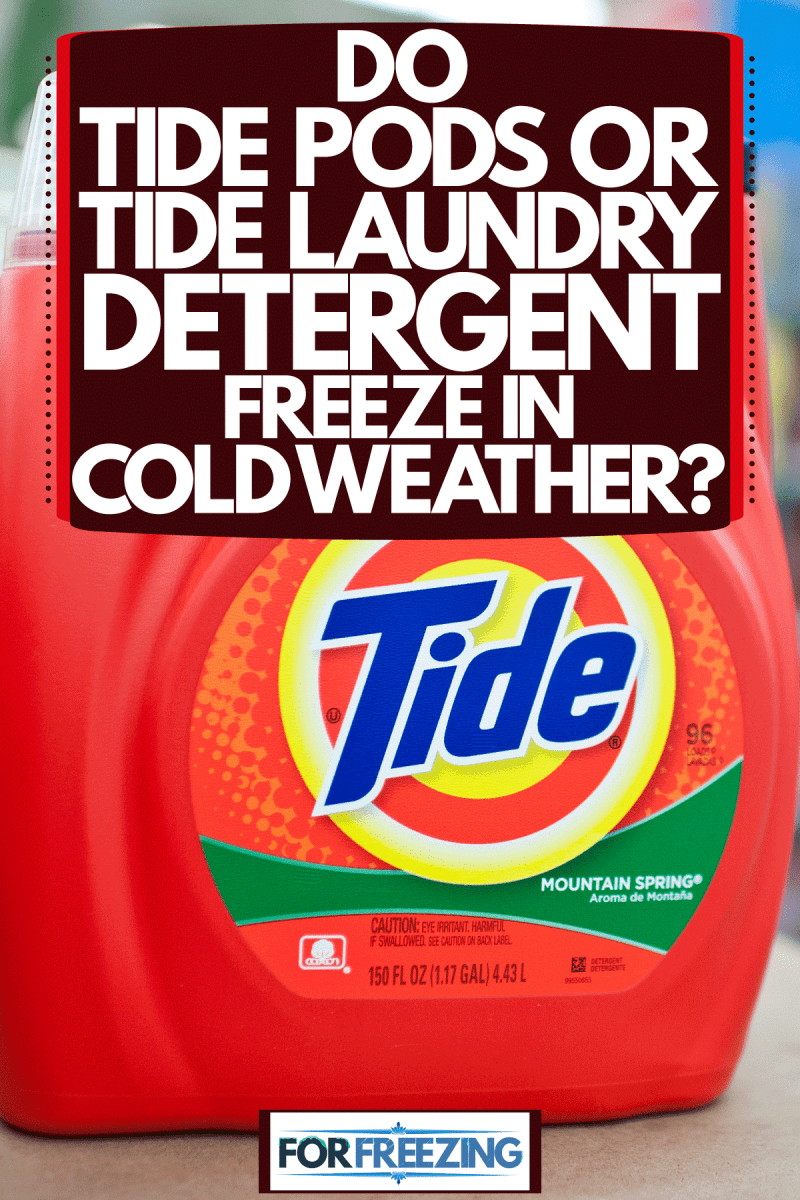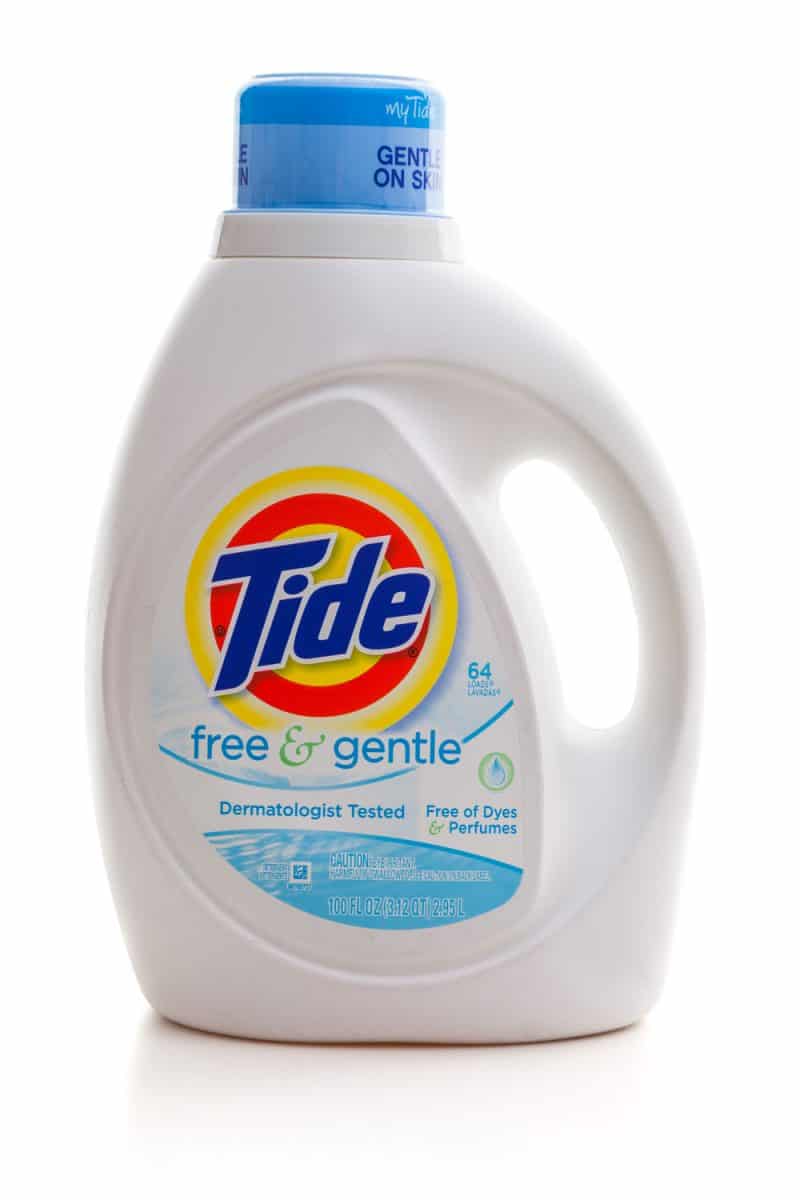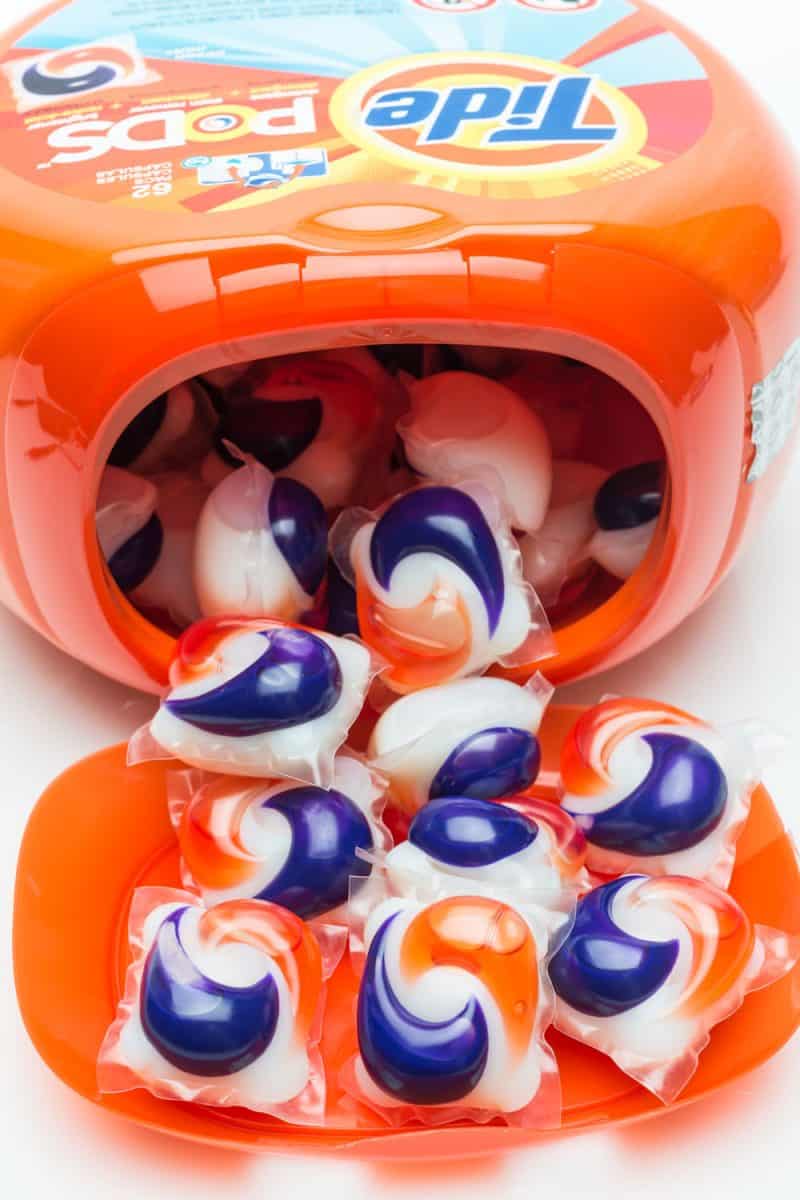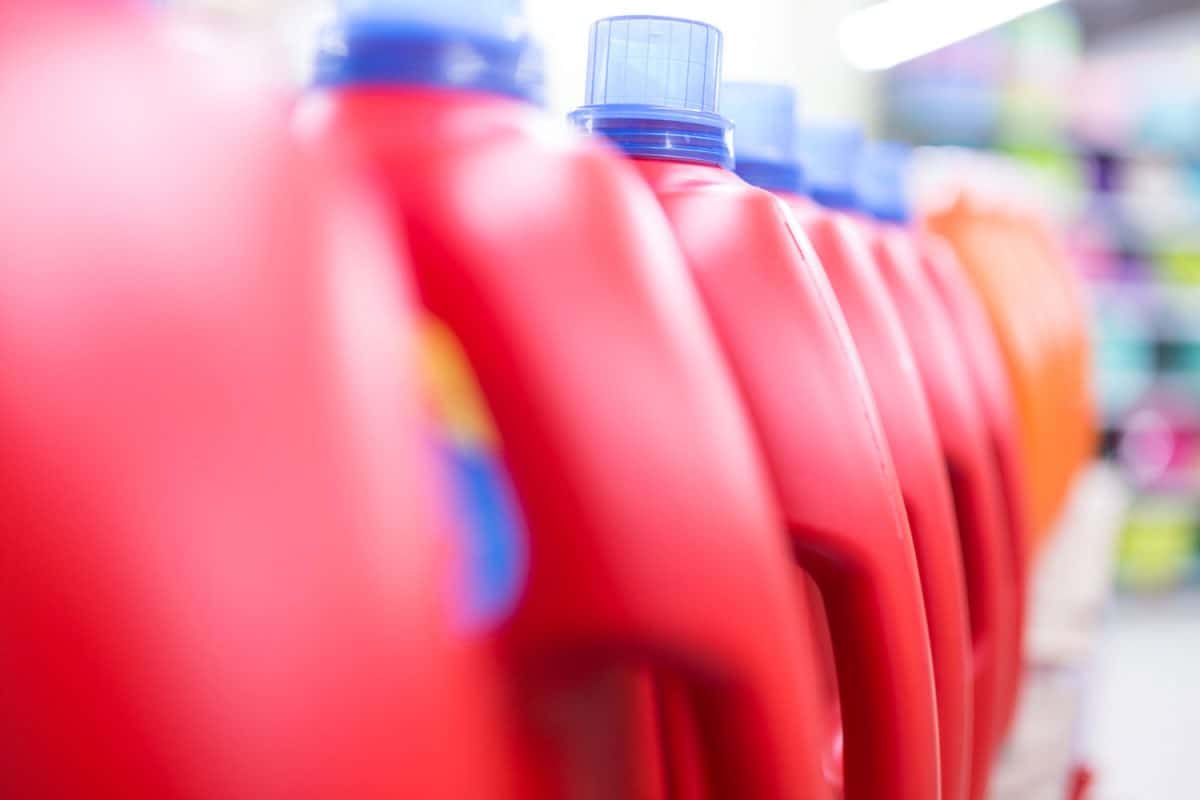As you pick a detergent that will give your clothes that magnificent clean scent, you could stock up when you find good discounts and bargains. Tide is well known for its excellent scent and properties. If you live in a cold climate, you may wonder if Tide pods or Tide laundry detergent freezes when it gets cold. Well, we asked experts about this, and they gave us reassuring answers.
Tide laundry detergent freezes partially, but the Tide pods don't freeze. This is because the Tide laundry detergent contains more water than the Tide pods. The pods have a higher concentration of soap than liquid detergents. Tide pods have 10% water in them, while the Tide laundry detergent has 50%. Other components found in the detergent and pods stop the soap from completely freezing. These components shouldn't be exposed to cold temperatures. They destabilize in cold weather and will affect the detergent's effectiveness.
Continue reading to discover which components freeze and which ones don't. This post will also help you understand how to get the most from your detergent. We'll also discuss how to launder clothes effectively.
NOTE: WE MAY GET A COMMISSION IF YOU DECIDE TO MAKE A PURCHASE THROUGH THESE LINKS. THERE'S ADDITIONAL NO COST TO YOU. CHECK THE BOTTOM OF THE PAGE FOR MORE INFORMATION.

What freezes and what doesn't in your tide?
Tide pods are more concentrated than liquid detergent. They are also less messy and energy-saving. Tide pods are effective even in cold water. The components below are all present in both the liquid laundry detergent and the pods:
Water
This is the main constituent in all liquid detergents, including pods. Water starts to freeze at 32 degrees Fahrenheit. The freezing point will be lowered by soap and other components in the detergent. The water will start freezing at 12 degrees Fahrenheit.
This will give your liquid detergent a mushy jelly look in the cold weather. The pods contain approximately 10% water. This makes it rather difficult for them to freeze. The concentration of detergent outdoes that of water.
Perfumes & fragrances
Fragrances and perfumes in detergents could be organic or chemical-based. They are water-resistant, and of course, don't contain water. This means that they don't freeze. Fragrances in detergents attract consumers because they leave clothes scenting wonderfully.
Manufacturers use fragrances and perfumes to mask the strong pungent smell of surfactants in the detergent. Detergents may contain mild or strong perfumes.
Surfactants & Enzymes
Surfactants repel water because they are hydrophobic. They don't freeze and they remain active in the detergent, even in cold water. These constituents help remove stains and clean the clothes without damaging them. They also lower the surface tension of liquids, in this case, water.
When surfactants are exposed to cold temperatures over a long period of time, they clamp and separate. This makes them lose their effectiveness in detergents.
Enzymes, on the other hand, are protein-based stain removers. They make sure that the stains come off clothes. Enzymes break down stains easily. They do not freeze in cold temperatures. Most detergents contain about 2% of enzymes. This amount is enough to make the soap effective in cleaning clothes.
builders
Builders are chemical compounds in laundry detergents. These compounds improve cleaning qualities by assisting surfactants. They don't contain water. This automatically means that they don't freeze.
They make up to 50% of the laundry detergent. They counteract hard metals found in water, which helps the detergent o lather.
Colorants & Dyes
Dyes and colorants in laundry detergents are oil-based. They could be pulled from plants or chemically processed. They repel water and can't freeze in cold temperatures. They perform no cleaning role at all.
Manufacturers use colorants to entice consumers. Others use them as a trademark for their detergents. Hue-dyes in the detergents give clothes a cleaner, brighter look.
What happens if tide pods freeze?

Tide pods have very little water in them. They never freeze. The constituents of the detergent don't allow the pods to freeze.
Moreover, Tide pods are encapsulated in a thin film. The film acts like a jacket for the contents inside. It ensures that the contents stay intact.
At what temperature does tide detergent freeze?
Tide laundry detergent, just like other liquid soaps, doesn't freeze solid. Cold temperatures make it gooey. Detergent stored in the garage or basement during winter could have a jelly-like consistency.
This is because it contains more water than Tide pods. Plus, the liquid has a wider surface area exposed to cold. When the Tide laundry detergent turns to a doughy consistency, let it sit in a warm place to thaw. It may take some time, but it will thaw.
The constituents will still be potent. Don't freeze-thaw your laundry detergent. This may cause some of its components to destabilize. The soap might not work effectively after such a cycle.
can you leave laundry detergent in a cold car?
No, you can't. Laundry detergent contains some amount of water. As the water starts to freeze, it expands. The water's expansion will expand the container as well. The container will swell and burst. You'll find the laundry detergent has spilled in your car.
The cold in the car could partially freeze the detergent to the extent that it could destabilize the polymer and surfactants in the cleaning detergent.
can you use laundry detergent after it freezes?

Of course, you can. Thaw the laundry detergent before use. If it was stored in the garage, take it into the house. Let the detergent thaw slowly at room temperature. However, don't be tempted to heat up your laundry detergent.
The sudden change in temperature could make the container explode. Some of the components in your laundry detergent shouldn't be heated. They could vaporize and cause irritation when inhaled.
How to achieve the best with your Pods and Laundry detergent
We may take it for granted that we know how to use our laundry detergents and pods. There have been many instances where consumers claim the pods or laundry agent wasn't effective. Most times, it was because they didn't use or handle the soap properly. Below are guidelines on the proper use of pods and liquid detergent.
tide pods
These capsules are one of the latest inventions. The pods have 3 chambers that contain detergent, remover, and brightener. They dissolve magically once they come into contact with water.
The pods are highly concentrated and you'll need to gauge how many you should use. The number of pods to use will depend on your wash load. Always place the pods in the drum of an empty washing machine. Load the washing machine, Choose the cycle, and wash.
Voila! That's it. These pods are effective in cold water! Add an extra rinse to your cycle to ensure you get all the detergent out of your clothes.
Tide laundry detergent
Tide laundry detergent comes with a measuring cup. There are indicators on the measuring cup. The amount of detergent necessary should be determined by the wash load you have got and how dirty the clothes are.
Pour the detergent into the detergent chamber. Set the cycle and wash as required. Don't use too much detergent. It becomes harder to rinse it off completely from your clothes. Washing with too much detergent could cause skin irritation.
parting thoughts

It's clear in this post that Tide pods don't freeze. The Tide laundry detergent partially freezes in cold weather. Some components in the laundry detergent never freeze. The components that freeze change the look of the detergent to a gooey play dough-like texture. When Tide laundry detergent thaws, it is still effective.
Note that detergents should not be left out in cold temperatures, especially in cold cars. Heat is not good for detergents, either. As for Tide pods, which have become the talk of the town due to their portability, they are easy to carry along. You don't need a large amount of these highly concentrated pods to do a huge wash load. So you could easily pack a few for your next trip.



